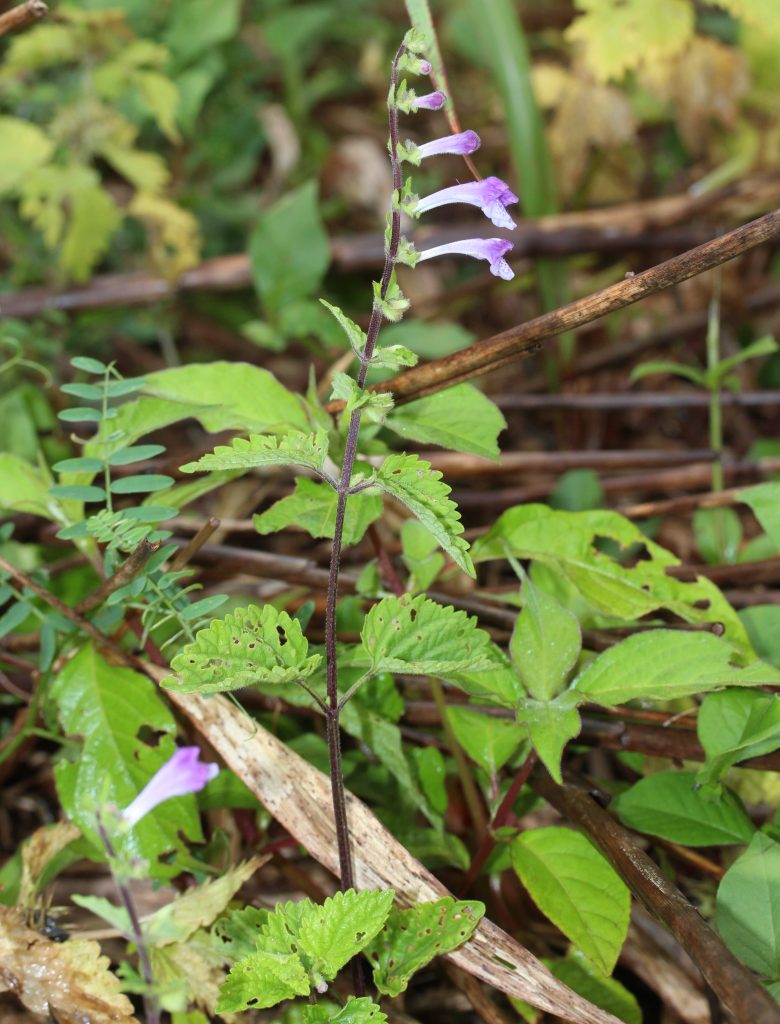 American skullcap (Scutellaria lateriflora) is a plant native to North America. It grows in meadows and swamps and has traditionally been used as an antispasmodic and sedative to treat epilepsy. These properties also give the herb the ability to treat anxiety disorders. Skullcap has been investigated for its anxiolytic effects in healthy humans. For example, in one study researchers administered 350 mg of Scutellaria lateriflora extract three times per day to a group of healthy volunteers that showed very low levels of anxiety. The results of the study showed that there was a significant reduction in the mood disturbances experienced by the subjects for those taking the skullcap extract, compared to the placebo. The authors stated that Scutellaria lateriflora extract significantly improved global mood in the subjects, while at the same time not causing serious adverse events in the subjects. Skullcap may therefore be a useful herb in the treatment of mild anxiety in otherwise healthy human volunteers.
American skullcap (Scutellaria lateriflora) is a plant native to North America. It grows in meadows and swamps and has traditionally been used as an antispasmodic and sedative to treat epilepsy. These properties also give the herb the ability to treat anxiety disorders. Skullcap has been investigated for its anxiolytic effects in healthy humans. For example, in one study researchers administered 350 mg of Scutellaria lateriflora extract three times per day to a group of healthy volunteers that showed very low levels of anxiety. The results of the study showed that there was a significant reduction in the mood disturbances experienced by the subjects for those taking the skullcap extract, compared to the placebo. The authors stated that Scutellaria lateriflora extract significantly improved global mood in the subjects, while at the same time not causing serious adverse events in the subjects. Skullcap may therefore be a useful herb in the treatment of mild anxiety in otherwise healthy human volunteers.
In another human study, researchers administered 350, 200 or 100 mg of freeze dried Scutellaria lateriflora extract to a group of healthy volunteers, There was a significant reduction in anxiety with the two higher doses of skullcap, 60 min after administration. The anxiolytic effects of skullcap have also been investigated in animals. For example, in one study administration of skull cap to rats significantly reduced the anxiety experienced by the animals when exposed to stress in a maze test. The phytochemicals in skull cap have been identified and characterised. skullcap contains the amino acid neurotransmitter GABA. In the brain GABA is an inhibitory neurotransmitter, which means that it decreases neuronal activity, and produces a calming effect. The presence of GABA may also explain the anxiolytic effects of skullcap. However, skullcap also contains the flavonoid baicalin and its sugar bound form (glucoside) baicalein. The presence of the flavonoids baicalin may explain some of the anxiolytic effect of skullcap.

Skullcap (Scutellaria lateriflora) is a flowering plant from the same family as mint (Lamiaceae). Skullcap is a perennial wildflower that grows to about 60 cm in height. It has a straight stem with a characteristic pink to blue flower. Its name derives from the fact that its dried seeds have a husk that is shaped like a skullcap. All of the plant is medicinally useful, but it tends to be the stem and leaves that are used to treat anxiety. Skullcap extracts when taken orally have a sedative and calming effect, which explains their use in traditional medicine to treat nervous disorders and anxiety. Image: By Alpsdake (Own work) [Public domain], via Wikimedia Commons
For example, the flavonoid baicalin has been shown to exert significant anxiolytic effects in mice. When baicalin was given with other anxiolytic drugs including the benzodiazepine drug diazepam, there was an additive effect, and some evidence suggests that baicalin may bind to the same receptor as benzodiazepine drugs. In another study, researchers showed that baicalin and it glucoside baicalein had anxiolytic effects in mice when the mice were exposed to electric shocks. Furthermore, these same authors presented evidence that these effects were likely due to the flavonoid binding to the benzodiazepine receptor in the brains of the mice. Baicalin belongs to the flavone subgroup of flavonoids. The flavones apigenin and chrysin have been shown to have anxiolytic effects in humans and animals possibly because they are able to bind to the benzodiazepine receptor. Flavones as a group may therefore share this effect, which may explain the anxiolytic effects of flavone containing foods and herbs.
Eat Well, Stay Healthy, Protect Yourself
RdB
